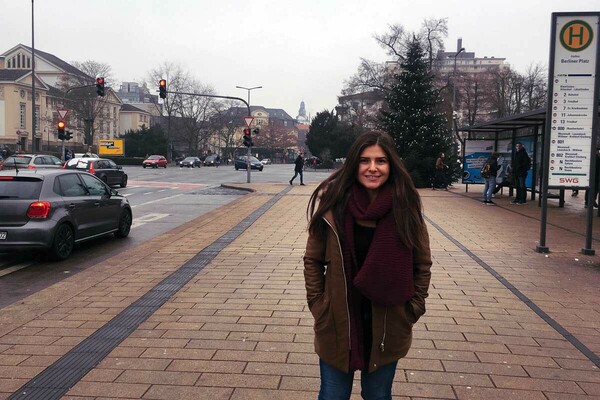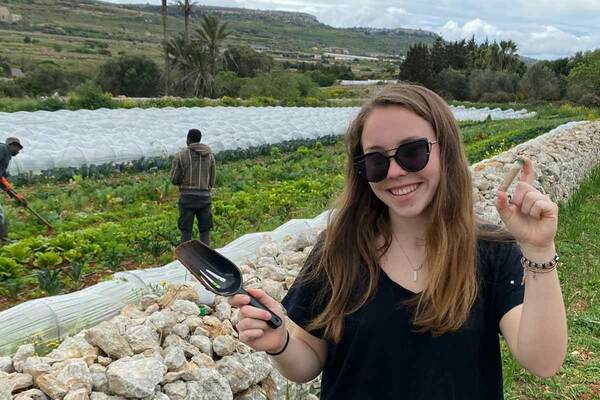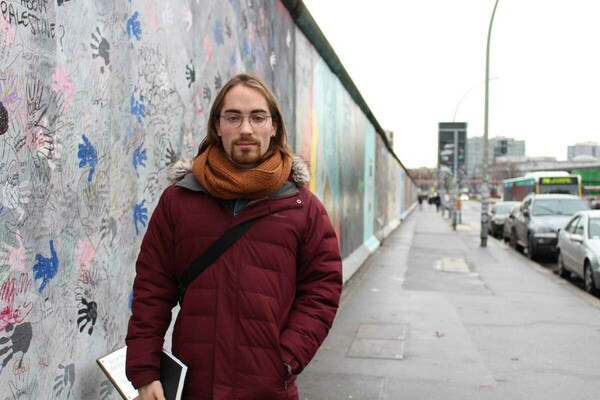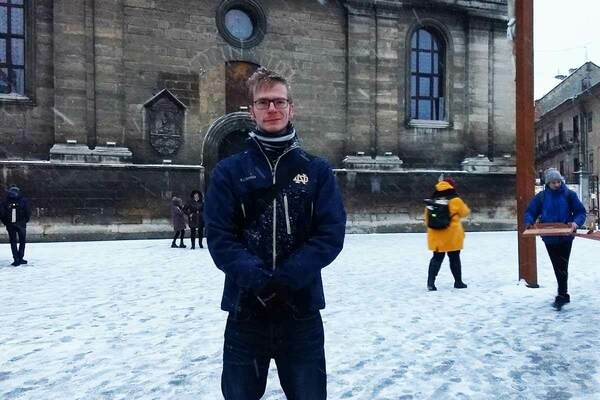

for European Studies
Peripheries
How do we imagine Europe? How should we reimagine Europe?

The Nanovic Institute is committed to enlarging the map with research and dialogue that encompass the lived experiences of all people in Europe, including those marginalized by geography, poverty, policies of citizenship, and difference, in order to explore the humanity of those people and places Pope Francis has called “the peripheries” (Evangelii Gaudium 20), which he specifically referenced during a 2024 greeting to the president and officials of the University of Notre Dame:
“We cannot stay within the walls or boundaries of our institutions, but must strive to go out to the peripheries and meet and serve Christ in our neighbor. In this regard, I encourage the University’s continuing efforts to foster in its students zeal for meeting the needs of underprivileged communities.”
The Keough School of Global Affairs seeks to accomplish just this mission. Furthermore, within the specific context of European studies, questions about peripheries, borders, and rural development (especially in Southern and Eastern Europe) have been a more prominent point of discussion and study over the past decade.
Despite this added attention in European studies, the theoretical concept of “peripheries” remains contested and, as a result, understudied. Some scholars, for example, wish to eschew a center-peripheries framework that might hearken back to the era of European colonialism. Others argue for the study of peripheralization as a process rather than the peripheries as fixed people or places. Recognizing this gap in scholarship, the Nanovic Institute has made “peripheries” a focus of its 2021-2026 strategic plan with the aim of creating a more diverse and nuanced understanding of what it means to be European. The institute aims to develop a theoretical framework for understanding peripheries and the processes of peripheralization, including spatial, structural, social and political, and epistemic peripheries. It also aims to establish a methodological and ethical approach to the study of areas, groups, and ways of knowing that are underrepresented in research and public perception. Areas of interest include, but are not limited to:
To pursue these research questions, the Nanovic Institute will partner with its faculty fellows, staff, students, and partners, as well as academics around the globe. By considering European studies through this lens, the Nanovic Institute will solidify Notre Dame as a distinctive institute for research on topics relating to the peripheries and the peripheralized, a process of “rethinking” Europe from the peripheries.
Currently, the Nanovic Institute has begun research in three pilot projects to gather data related to peripheries for scholarly attention.
Partizánska Ľupča, a rural village in Slovakia (pictured in the header of this page)
Gaelteach (Irish-speaking) communities in Western Ireland
L'Arche communities in Italy
The findings from these projects will form the basis of the institute’s deepening conceptualization of peripheries, including definitions and applications. Ultimately, the goal is to publish a handbook on the concept of peripheries in European studies, as well as a related book series.
One of the highlights from this research priority so far has been the conference "Reimagining Europe from Its Peripheries," held April 27-29, 2023. This conference welcomed scholars, practitioners, and policymakers from across the United States and Europe to discuss Europe's "peripheries" and related topics, including migration, integration, colonialism and decolonization, law, and literary analysis. As a whole, this gathering and its contributors examined the political and cultural "structuring" of European belonging, from the perspective of its ever-shifting, often-precarious peripheries — and its peripheral subjects. It was a fruitful way to nurture the conceptualization of peripheries and peripheralization.
Additional follow-up activities and further contributions are expected in the months and years ahead, including a virtual workshop in fall 2023.
Read more about the event and its speakers
Have you read through this page and believe your research, project, publication, or proposal fits with the theme of peripheries? Do you want to be involved in the Nanovic Institute’s work in this area and engage with our partners and audiences?
If so, you are invited to fill out the form below to let us know. It should take less than five minutes.
Share your research goals and interests
Belgrade, Serbia
This graduate student project explored how structured social practices are critical to preserving cultural traditions and meaning-making in refugee populations who find themselves in challenging socio-ecologies, thereby contributing to stress mitigation and relatively better health outcomes. The project sought to map structured social practices as emergent social phenomena in Serbia that can be compared across refugee populations, measuring their effect on stress and health.
Faculty Advisor: Rahul Oka
London, England
This undergraduate fall break project examined urban bordering in London and its relationship to the past, present, and future of Brexit. The project focused on whether visible/invisible bordering practices between ethnic communities exist in London, and if the Brexit referendum changed the way migrants experience bordering in their everyday lives. The project employed informal observations of urban border spaces and in-person interviews with migrants.
Berlin, Germany; Ankara, Turkey
This graduate student project studied the cultural nuances of Berlin and Ankara, particularly among the immigrant working class, as research for Nazli Koca’s novel A Cleaner’s Diary. The novel explores the experiences of immigrants whose national identities are seen as challenges by their new homes, uniquely focusing on the limitations of language from multiple perspectives within immigrant working class communities. The novel aims at informing the perception of new immigrants, particularly those who come from Muslim countries, in contemporary Europe—helping them integrate into new cultures without losing their own native identities.
Clifden, Ireland
This undergraduate fall break project explores the Irish food system, aiming to understand how it promotes access to healthy, nourishing foods at low costs and how other large economies like the United States could learn from it. The project studied this food system on the ground, researching the Connemara region which is known for its family farmers and small producers.
Faculty Advisor: Kevin Whelan

Lisbon, Portugal
This graduate student project explored how agricultural production in Portugal and Angola contributed to notions of race that circulated in the Portuguese empire between 1760-1860. The project studied European historiography and new primary sources on Portuguese society to expand on the transformations of production and social classification left uncovered in previous research. The project sought to contribute to scholarship by considering how the society and government of Portugal understood and interacted with African peoples in the region of Benguela at the height of the transatlantic slave trade.
Faculty Advisor: Mariana Candido
Seville and Cordoba, Spain
This undergraduate winter break project studied the lasting Moorish influence in southern Spain, particularly through the ornamentation belonging to the architectural style of Mujédar. The project sought to better understand the unique nature of the Andalucía region and contribute to the ongoing conversation regarding migrants and acceptance between different cultures and religions.
Faculty Advisor: Olivier Morel
Dublin, Ireland
This undergraduate fall break project addressed the influence of the Irish language on Irish nationalism amongst women during the 1916 Easter Rising. Specifically, how something as simple as an Irish language class offered to women in Universities awakened and attracted them to the militant cause of Irish Nationalism. The project sought to make connections to contemporary Irish pride and the role of the Irish language in the present-day Irish identity.
Faculty Advisor: Paul Ocobrock
Connemara, Ireland
This faculty grant aided in funding the conclusion of the Dresser Project, a research project focused on western Ireland. This project combined multidisciplinary approaches to materiality and homemaking to investigate how people in rural Connemara villages sustained their communities after waves of emigration. The project investigated tangible strategies of those who remained in their homes despite the often-overwhelming adversity associated with staying amidst the tumult of the nineteenth and twentieth centuries.
Spain; France; Netherlands
This faculty grant provided funding for archival research in Spain and France for Ashley Bohrer’s current book project, Capitalism and Confinement. The book offers a Marxist-feminist analysis of how modern forms of property were formed in and through European colonization of the Americas, with important global effects inside the borders of Europe as well as in its overseas colonies.
Huelva and Castilla-La Mancha, Spain
This graduate student project examined the decentralized immigrant regularization model in Spain, considering how local governance structures irregular migrants’ opportunities for regularization. The project connected the sociological and legal studies literature on civic stratification to that of local governance to show how municipal-level policies can alleviate or exacerbate existing social and political inequalities. The project also sought to contribute to literature by focusing exclusively on non-metropolitan areas, which have been largely neglected by academics and politicians, and analyzing why analogous municipalities enact policies that are more or less inclusive of undocumented populations.
Notre Dame, Indiana
This faculty grant co-supported a visit from Dr. Sabrina C. Agarwal (UC Berkeley), a preeminent scholar of bioarchaeological research on the anthropological causes and effects of changes in human skeletons over time. During her visit, Dr. Agarwal presented a public lecture on her research on Medieval Europe and feminist theoretical approaches to biographies of past peoples, and she spoke in Meredith Chesson’s “Archaeology and Gender” course.
Venice, Italy; Notre Dame, Indiana
This faculty grant provided funding for travel to the Venice Biennale, a biannual international art exhibition. Research done at the Venice Biennale of various works of art, including Larissa Sansour’s “Heirloom,” informed James Collins’s course “Envisioning Contemporary Europe: New Political Realities in Film, Art, and Literature.” The course itself focused on how European artists capture the tensions and issues of contemporary Europe in their artwork, including issues of European integration, gender identity, and cultural heritage.
London, England
Focusing on the T4 euthanasia program that systematically killed an estimated 70,000 people with disabilities and mental ilnesses in Nazi Germany, this undergraduate fall break project explored the complex relationship between the ideologies of Nazi perpetrators and America’s own eugenic beliefs. The project utilized documents in London’s Wiener Library which holds the complete records of the UN War Crimes Commission.
Faculty Advisor: John Deak
Granada and Seville, Spain
This undergraduate summer break project studied gridded towns in the regions of Andalusia and Extremadura in Spain to understand their role as precedents in colonial American urban planning. The project utilized archival data and compared these to Spanish colonies in America.
Faculty Advisor: Selena Anders
Berlin, Germany; Paris, France; Notre Dame, Indiana
This faculty grant provided funding for the German translation of Olivier Morel’s film Ever, Rêve, Hélène Cixous for its screening at a German film festival. The film centered around the formation of Hélène Cixous, a feminist legend, 1968 activist, playwright, and poet, examining her friendship and company along the way.
Lviv and Kyiv, Ukraine; Budapest, Hungary; Bremen, Germany; Somerset (NJ), New York, Amherst, and Boston, United States
This graduate student project explored the development of the Ukrainian human rights movement in the Soviet Union, challenging the perception of the dissident movement as anti-governmental and oppositional. The project focused on the ways that the most influential Ukrainian dissidents abandoned the early twentieth-century tradition of confrontational opposition for legal means enshrined in the Soviet constitution. The project emphasized the significance of the regional perspective in the emergence and distribution of human rights ideas across geographic space.
Faculty Advisor: Semion Lyandres
Notre Dame, Indiana
This faculty grant provided funding for a visit from Fabienne Kanor, a French author and an important voice in current debates on migration and national identity in Europe. During her visit, Kanor gave a “Performance Talk” entitled “Another Sea to Cross,” given in a bilingual English-French version. Her presentation drew from her work as a novelist and filmmaker, delving into questions of immigration and displacement in Europe and bringing together three crucial moments that feature the two (the trans-Atlantic slave trade, the migrations of French Caribbean people to France, and contemporary migrations and asylum seekers).

Helsinki, Finland
European countries handled the refugee crisis of the later half of the 2010’s differently. In Finland the government provided refugees within their borders with digital identities via blockchain networks. This undergraduate winter break project studied the technical aspects of the self-sovereign identity platform and whether or not it could be implemented at a transnational level by the UN.
Faculty Advisor: Eileen Hunt Botting
Dublin and Cork, Ireland; Oxford, England
This graduate student project examines the social history of the women of Irish-speaking Ireland from 1300-1600, specifically their perspectives on “honor.” Breaking from traditional medieval Irish historiography, the project sought to explore the idea of honor as a constitutive aspect of all Gaelic society, rather than only in the realm of the elites, and the ways in which women shaped and were shaped by these ideas. The project engaged with numerous manuscript genres, including colophons from medieval texts, legal commentaries, bardic poetry, genealogies, annals, and ecclesiastical records.
Faculty Advisor: Rory Rapple
Lisbon, Portugal
This faculty grant provided funding for travel to Lisbon to continue archival research on Portuguese captives in the Barbary Coast and Muslims in Portugal. The research project sought to identify Portuguese colonial officers and slave traders captured and held in bondage in the Barbary Coast under Ottoman rule. The project aimed to understand how their years in captivity transformed their lives, whether captivity altered their understanding of the transatlantic slave trade, and how they related their experiences to the lives of African people they had previously bought and sold.
Berlin, Germany
An aging society, consistently low birth rates, and a rising influx of refugees has left the German population to consider what it means to be German, a question they have struggled to answer since the end of World War II and the rejection of Nazism. This undergraduate winter break project explored how architectural design can foster community, artistic creativity, and a sense of individual and national identity in modern Berlin. The project also employed traditional and modern German construction techniques to propose a mass-timber tower, aiming to bring Germany to the forefront of the global sustainability movement.
Faculty Advisor: Kim Rollings
Notre Dame, Indiana
The emergence of Black Lives Matter movements around the world has catapulted interest in scholarship on Europe’s legacies of empire not only in former colonies but within Europe itself. There is currently a lack of literature on the significance of slavery and colonialism in the history of France itself. This faculty grant aided in funding the French translation of Sophia White’s most recent book, Voices of the Enslaved: Love, Labor, and Longing in French Louisiana, for publication in France to spearhead new scholarship on this topic.

Hessen and Berlin, Germany; Vienna, Austria
This graduate student project explored how community-building takes place among minority migrant populations—spatially and temporally—in relation to the already existing communities in the urban places where migrants settle. The project focused on identity formation from a relational and performative perspective through the lens of place-making, language use and retention, and religious practices among the Zazaki diaspora in Europe and western Turkey. The project sought to answer what the dynamics of identity formation, maintenance, and performance are, and how these Zazaki speakers negotiate and produce/reproduce their identities as shaped by their environment.
Faculty Advisor: Maurizio Albahari
Berlin, Germany
More than one-fifth of Germany’s inhabitants are foreign-born or children of immigrants, yet Germany’s educational system often fails to integrate children with these backgrounds. Campus Rütli was founded in 2008 by the government of Berlin to address these growing civil disturbances and disadvantages in the highly diverse district of Neukölln. This undergraduate winter break study sought to better understand Campus Rütli’s policies of immigrant assimilation through education, revealing what is effective in dealing with the social, economic, and local repercussions of hyper-diverse migrant communities.
Faculty Advisor: Steffen Kaupp
London, England; Dublin, Ireland
This undergraduate summer break project explores the emigration of French Huguenots to Ireland, focusing on the complex relationship between a people fleeing religious persecution from Catholics to an island where Catholics were the persecuted. The project conducted archival research in London and Dublin, including Huguenot sermons and military records, to study the lives of French Huguenots and their participation in the Jacobite War in Ireland.
Faculty Advisor: Rory Rapple
Dublin and Enniskillen, Ireland; Celbridge, Northern Ireland
This undergraduate spring break project explored the architectural style of Irish Palladianism, a subgenre of Palladianism that has received little attention. The project sought to answer what caused this Palladianism to become so popular in Ireland, how the style was adapted to the climate and culture of Ireland, and how the style functioned as a precedent for American Palladianism.
Faculty Advisors: Jonathan Weatherill, Ingrid Rowland
Dublin, Ireland
This undergraduate spring break project explored how the laity of Ireland has responded to the secularization of their country after a long standing association between the Catholic Church and Irish society. The project interviewed Professor Siobhan Garrigan, an expert in how theology has the ability to build bridges of communication across boundaries, and Sister Geraldine Smyth, a theological consultant to the World Council of Churches, both from Trinity College Dublin. The project compiled the information gathered in a final essay on the subject.
Faculty Advisor: Kenneth Oakes
Southern United States; United Kingdom
This faculty grant aided in funding a research project on the misrepresentation of Islamic law and misinformation about the Islamic faith in the United States and Europe, particularly the United Kingdom. The project juxtaposed the practice of sharia law in Muslim populations to non-Muslim perceptions regarding sharia law. The project aimed to contribute to the conversation about the place of sharia law in secular society, especially with rising anti-Islamic rhetoric and far-right parties in many European countries.
Notre Dame, Indiana
This faculty grant provided funding for a visit from Ivan Gerginov, Deputy Commissioner, Commissariat for Refugees and Migration, Republic of Serbia. Gerginov held a public lecture sharing his experiences working with refugees and migrants from the Balkan crises to the present migrant crisis in Europe. He also held personal meetings where he advised faculty members on policy outreach and the need for policy interventions.
Newbridge, Kildare, and Dublin, Ireland
The Clubhouse model is a wellness-based recovery model for those with mental illness characterized by nontraditional methods and community-building. Despite having an international research archive, there is currently no research on the effectiveness of the model in Ireland, which has a unique medical context. This undergraduate spring break project examines the model’s effectiveness in Ireland through full immersion in a Clubhouse community.
Faculty Advisor: Lisa Anderson
Munich and Stuttgart, Germany
This undergraduate spring break project investigated the efficacy and shortcomings of current job assistance and labor market integration programs in Germany for refugees. The project explored the current state of these programs through interviews with local specialists, visits to job preparation centers, and meetings with Munich-based scholars. The project sought to understand the German labor market for refugees and the challenges it presents to Germany’s economic identity for future research.
Faculty Advisor: Denise Della Rossa
Notre Dame, Indiana
This faculty grant provided funding for a presentation entitled “Language and Power: The Making of the Catalan Linguistic Identity.” The presentation, based on a monograph by Lledó-Guillem, focused on the political, ideological, and cultural events that made the appearance of the Catalan linguistic identity possible in the thirteenth century using an interdisciplinary approach.

Mġarr, Malta
Lacking lakes, rivers, or reservoirs and thus relying on groundwater and desalinization, Malta faces rapidly approaching challenges due to climate change. This undergraduate spring break project examined whether Maltese soil is negatively affected by recycled water irrigation by analyzing and comparing soil pH and nutrient levels from farms irrigated with freshwater and recycled water.
Faculty Advisor: Donna Glowacki

Vatican City; Rome, Italy; Dublin, Ireland
This undergraduate fall break project compared the deep veneration of Mary in the Catholic Church with the silencing of female Catholic religious, specifically the nuns in Northern Ireland and the sisters in Rome who write for Women Church World, and survivors of sexual violence on Catholic campuses in the United States. The project sought to answer how religious institutions either inadvertently or explicitly silence the voices of survivors through forced forgiveness, exclusive policies, and victim-blaming rhetoric and practices. The project also considered how female religious leaders are reshaping the narrative and interpretation of religious text and how this feminist hermeneutical work may set the Catholic Church up to be more inclusive of female voices in the future.
Faculty Advisor: George Lopez
Athens, Greece
This undergraduate winter break project investigated social implications of the construction of the first mosque in Athens, Greece since the Ottoman Empire’s occupation of the city in 1833. The project focused on whether Muslim migrants are encouraged by the construction of a public mosque in Athens as a sign of acceptance and support of their religion, and how conservative Greeks are responding to the construction.
Faculty Advisor: Rev. Robert Dowd, C.S.C.
Notre Dame, Indiana
This faculty grant sponsored a visit from Sandro Cattacin, a professor at the University of Geneva (Department of Sociology). Cattacin spoke at the Mendoza College of Business’s spring 2019 lecture series “Ten Years Hence,” presenting on European, Middle Eastern, and North African migration patterns and the Swiss national guest worker program. He also engaged with students in discussion and networked with faculty members.

Copenhagen, Denmark
While in the United States race data is collected in demographic surveys, most European governments collect ethnic data and prohibit race data in adherence to a “color-blind” narrative and a priority to monitor migration trends and assimilation. This graduate student project explores the differences in daily experiences between multiracial “ethnic-Danes” and white ethnic-Danes, the former of which confirm insider and outsider status. The project sought to contribute to literature by studying this phenomenon in a smaller country where populations are not enumerated by race and demonstrating that official government categories are not necessary for racialization processes to occur.
Faculty Advisor: Terence McDonnell
Notre Dame, Indiana
This faculty grant provided funding for a virtual discussion with Nabil Wakim, a journalist for the French newspaper “Le Monde” and author of L’arabe pour tous: Pourquoi ma langue est tabou en France. In his book, Wakim discusses France’s relationship with the Arabic language in the context of growing islamophobia within the country. The virtual discussion was centered around the book.

Berlin, Germany
This graduate student project studied how Zazaki-speaking immigrants and their descendants build their communities through everyday life practices in Germany. The project consisted of anthropological research in the form of long-term participant observation. The research done in this project informed a dissertation which explored how group identity is expressed across nation-states among minority immigrant populations by focusing on domestic and international migration of Zazaki speakers in western Turkey and Germany.
Dover, England; Calais, France; Rotterdam, Netherlands
In discussions concerning a no-deal Brexit, port cities along the English Channel have been largely overshadowed by the legal questions surrounding the border between Northern Ireland and the Republic of Ireland. This undergraduate winter break project investigated to what extent cities along the Channel would be affected by various models of custom checks, and whether regional governments and shipping companies have largely accounted for potential border checks. The project analyzed the scope of these potential outcomes and other negative externalities arising from a hard Brexit based on predictions from various actors in Dover, Calais, and Rotterdam.
Faculty Advisor: Susan Page
Vatican City
This graduate student project examined the life and career of Ella B. Edes (1832-1916), an American lay woman who worked in Rome as a journalist for many Catholic publications and acted as a translator, money manager, and reporter for the Propaganda Fide, the Holy See’s congregation for overseas “mission territories.” In contrast to earlier historians who viewed Edes primarily as an “agent” of bishops trying to advance their causes at the Vatican, this project investigated the broad scope of Edes’s life and work in Rome and the meaning of her “peculiar position” as a person of influence whose official recognition and advancement at the Vatican was severely limited by her gender.
Faculty Advisor: Kathleen Cummings
Calabria, Italy
This faculty grant provided funding for three faculty and two select graduate students to research and travel to Calabria, Italy. The research group met with local scholars, visited sites, and investigated cultural institutions dedicated to heritage development of minority languages, local histories, and archaeology.
Copenhagen, Denmark; Malmo, Sweden
Swedish and Danish ecovillages promote deeper connections with nature, nearby communities and other citizens. This undergraduate fall break project studied best practices for community-based and nature-centric villages with a focus on those who care for the dwellings and community spaces and how they were integrated into the broader urban landscape.
Faculty Advisor: Kimberly Rollings
Lisbon and Coimbra, Portugal
When discussing the refugee crisis, Portugal is often overlooked; while many immigrants do not even consider the country as a destination, it has agreed to take double the number of immigrants allocated to them by the EU. This undergraduate spring break project investigated what the attitudes toward immigrants, particularly Syrian/Middle Eastern refugees, are like in Portugal and what the country has done proactively to either attract or deter immigration. The project interviewed government officials, NGOs, migrants, and Portuguese citizens.
Faculty Advisor: Marcio Bahia
Paris, France
This faculty grant supported a course taught in the Notre Dame Summer Study Abroad Program in Paris, “Postcolonial Paris: Contemporary French Cultures in Literature and the Arts.” The course concentrates on the ways contemporary “French” cultures are reconsidered and redefined by writers and artists from outside France. The course explores novels by immigrants and second-generation immigrants, critical articles and book chapters by contemporary scholars and politicians, films, and cultural events including a ballet at the Opéra Garnier.
London, Gloucester, Bradford, and Wigan, England
This graduate student project explored how nineteenth-century British women writers used representations of physical mobility to resist or critique restrictive gender ideologies by analyzing both contemporary fiction and women’s life writing. The project suggested that the ability to travel, even on a small scale, played a significant role in how women conceptualized their relationship to convention. The project sought to contribute to scholarship by offering fresh insights on a neglected aspect of women’s mobility and placing a new emphasis on women’s ability to navigate and resist social restrictions in their everyday lives.
Faculty Advisor: Sara Maurer
Seville, Spain; Rome, Italy
This graduate student project examined the ways that the serial, incomplete emancipations toward the independence of the Dominican Republic transformed race and the institution of slavery in the colony. The project followed the activity of the colonizing powers (Spain, France, and Saint Domingue/Haiti), slave holders, and freedom-seekers in slave markets, criminal courts, notarial offices, plantations, and churches in a colonial struggle for freedom. The project also collected material for a secondary research topic concerned with how mahogany shaped racial ideas, freedom, landholding, and state-building in the Spanish Empire from the sixteenth through nineteenth centuries.
Faculty Advisor: Karen Graubart
Geneva, Switzerland; Brussels, Belgium
This undergraduate fall break project continues summer research on-site in Geneva, Switzerland and Brussels, Belgium. The project questions how European agencies, international agencies, and non-governmental organizations based in Europe are responding to the influx of refugees generally and providing for the most disadvantaged and vulnerable population—those with disabilities. The project included visits with the International Rescue Committee, the International Committee of the Red Cross, and the European Commission, among others.
Faculty Advisor: George Lopez
Notre Dame, Indiana
This faculty grant sponsored a screening of the film Habemus Feminas at Notre Dame’s Browning Cinema and a discussion with filmmaker Silvan Maximilian Hohl from Switzerland. The film captures a 2016 pilgrimage of women from St. Gallen, Switzerland to Rome that demonstrated “the Catholic Church in solidarity with women” and submitted a petition to Pope Francis.
Madrid, Spain
This undergraduate fall break project explored the curtailing of government-funded, gender equality Institutions in Spain following the 2008 economic crisis. The project examined whether women were at greater risk for unemployment than men in Spain and if women experienced less economic mobility as a result of the austerity policies adopted in Spain following the 2008 economic crisis.
Faculty Advisor: Mary Flanner
United Kingdom
This faculty grant provided funding for an interdisciplinary conference exploring the complex reality of xenophobia and what role it played in medieval and early modern societies within Europe and beyond. The conference had a special focus on the domains and intersections of literature, religion, theology, politics, and history, featuring keynote speakers and panel conference papers highlighting new ways of thinking about the issue of “the stranger” in this historical context that can inform our contemporary understanding.
Oslo, Norway
This undergraduate spring break project explored questions about refugees and their effects on the identity of Norwegians, considering how refugees’ experiences shape Norwegian culture, and how institutions are shaping attitudes towards these changes. The project looks at the issues through the lens of the blending of refugee/Norwegian culture through institutionalized and structural approaches, and the lens of cultural blending through unstructured socialization.
Faculty Advisor: Justin McDevitt
Athens and Examilia, Greece
This faculty grant supported a Roma soccer team in the village of Examilia outside of Ancient Corinth, Greece. The team, which had a transformative effect on the village and its young men, had lost its primary sponsor, and needed extra funding. The team was a way for young Roma to escape the cycle of drug usage in the village and provided a way for them to integrate and be accepted in Greek society, where they have been historically ostracized.

Olot and Madrid, Spain
This graduate student project investigated different narratives and images of female bodies’ inspections (medical, inquisitorial, juridical, and ethnographical) that shaped the definition of gender in the Hispanic world from the sixteenth century to the present in relation to other European theories and knowledge about anatomy. The project conducted archival and bibliographic research and examined anatomical and artistic sculptures and models to inform a dissertation on the subject.
Faculty Advisor: Carlo Jauregui
Image Credit: At the Water Trough by J. Alden Weir, 1876-1877, Smithsonian American Art Museum.

Berlin, Germany
This undergraduate winter break project examined the impact of designed, isolating borders in a dense urban environment by studying the Berlin Wall’s architectural and cultural legacy. The project focused on what land was reclaimed from the Wall by Berliners, how the land was reclaimed, and how the Wall’s history has been celebrated and maintained. The project also suggests design remedies to areas that remain in disuse from the Wall’s deconstruction.
Faculty Advisor: Ettore Mazzola
London, England; Madrid, Spain; Rome, Italy
Public spaces in urban environments have historically played a crucial role in developing democratic political cultures, giving people places to interact with each other in political demonstrations, conduct business, or share leisure—places in which they develop civil society. This undergraduate summer break project examined the precautions raised in public spaces following terrorist attacks which make public spaces less welcoming, or at worst hostile. The project documented temporary obstacles found in public spaces in London, Madrid, and Rome, and aimed at developing empirically-based solutions for guaranteeing public safety in urban environments.
Faculty Advisor: Ingrid Rowland
London, England
This graduate student project explored female education reform in India and the people who held the most power to enact it—British women and elite Indian men, the latter of which adopted a veneer of whiteness to become “native gentlemen.” The project investigated how this specific performance of race and gender allowed white women and Indian men to form professional partnerships even during the final century of the British Empire, a period where both groups were strictly segregated.
Faculty Advisor: Fr. Robert Sullivan
Brussels, Belgium
This undergraduate spring break project studied what systems are in place through NGOs to alleviate the issue of increased immigration that has faced Brussels’s government since 2015. The project focused on interactions with social workers and volunteers on the frontlines of the problem in Maximilien Park.
Faculty Advisor: Emilia Powell
London, England; Strasbourg, France
This undergraduate summer break project examined the experiences of the Roma in two different countries, England and France, to study the complex interactions between individual Roma populations and the communities in which they live. The project aimed to understand the Romani within the context of their specific, diverse communities, and recognizes the non-homogenous economic, social, and cultural circumstances of each culture group.
Faculty Advisor: Emma Rosenberg
Cortona, Italy; Valletta, Malta
This architectural winter break study sought to understand the influence of the Italian Renaissance ideals on the capital city of Malta. The project also studied the development of the work of Francesco Laparelli across national borders and project genres.
Faculty Advisor: Steven Semes
Inishbofin, Letterfrack, and Fountainhill, Ireland
This undergraduate fall break project analyzed how natural resources have been integrated into the culture of rural life and if that culture is sustainable in contemporary livelihoods. The project served as research for a scholarly paper and documentary exploring the use of traditional knowledge regarding the use of natural resources in Co. Galway, Ireland and analyzing how cultural practices have resulted from the local environment.
Faculty Advisor: Ian Kuijt

Dublin, Ireland; Belfast, Northern Ireland
Scholarship on women’s roles during The Troubles has often simplified them to that of supporters or peacemakers. This undergraduate summer project moved past the traditional view of women working as peacemakers and enriches our understanding of how women and gender influenced paramilitary groups and violence during and after The Troubles. The project focused on women’s participation in the Ulster Volunteer Force and the government-organized Ulster Defence Regiment rather than their roles in the IRA.
Faculty Advisor: Gail Bederman

Lviv and Kjiv, Ukraine
This graduate student project investigated questions of identity, nationalism, and geopolitics involving Ukraine and Russia, specifically to what extent the 2012 Ukrainian Language Law consolidated the Ukrainian identity. The project sought to better understand Ukrainian perspectives on identity and citizenship among the public and the government through survey/focus group data and interviews with community leaders, academics and experts, and journalists.
Faculty Advisor: James McAdams
Clermont-Ferrand, France
This graduate student project undertook the process of editing, transcribing, and translating Vie de Saint-Léger, a tenth-century biography that is an early monument of French literature. The biography, which had no critical editions or translations into the English language, speaks profoundly to contemporary problems in European life, as it recounts a story of interregional migrations, their dangers, and their controversies. The project conducted archival research in Clermont-Ferrand, France on the biography to gather essential notation and letterforms often incorrectly copied and therefore mistranslated.
Notre Dame, Indiana
This faculty grant aided in funding publication for a co-edited volume on the topic of women and work in contemporary France. The contributions for the volume tackled a wide range of work experiences from salaried work in academic, artistic, corporate, and working-class worlds to unpaid—reproductive, domestic—labor, illegal activities, and activism.





